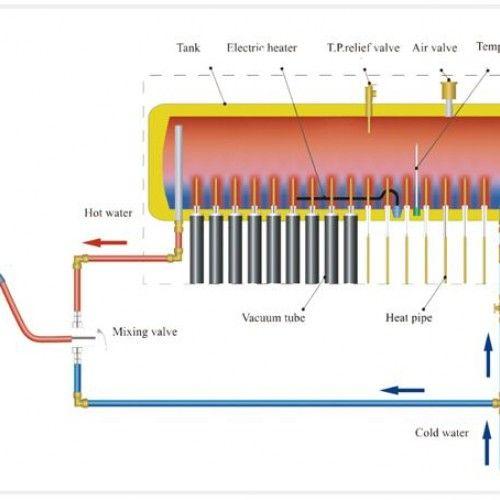Are you looking to invest in an
affordable solar water heating system? If yes, then you should look no
further than an integrated or compact solar water heater. Northern Lights compact solar water heating system uses the performance-driven TZ58 1800 SunRain solar collectors.
These collectors are specifically engineered for the residential hot water purposes. They come with a storage tank and heat pipe vacuum tubes integrated to a unit. These units are SRCC certified for accommodating hot water requirements of a family of four to five persons. They have the 80 galloon stainless steel made water tank. The tank is heavily insulated for enormous performance and efficiency.
Generally, the compact solar water heater needs to be installed on a south facing roof or on the ground with a 45 degree frame system. You can install and connect this system easily. The cold water intake connects to one end and the hot water supply to the other end.

The heat pipes contain 30 tubes present inside the storage tank. The water gets heated by transferring energy from the vacuum tubes to the heat pipes and directly to the potable water. The hot water goes to the top of the storage tank where it starts supplying hot water to the home.
Typically, a compact solar water heater is considered as efficient unit and requires no maintenance. It uses a vacuum tube with a heat pipe and an internally sealed heat exchanger. There’s no need to worry about when a tube gets damaged. You just replace the damaged tube and the system continues working without this tube.
No Requirement of Electricity –
A compact solar water heater is a pressurized system. It won’t contain any pumps. Water moves through the system by using the pressure from the municipal water supply. As soon as you open your water faucet, hot water from the storage tank flows outside and the cold water goes inside the tank for heating by using solar evacuated tubes.
No Excessive Heating –

This type of solar water heater comes with a built-in air release valve and temperature and pressure valve which opens at 90 C or 194 F. when the system gets hot, it will vent off the excess amount of heat.
Durability –
Both interior and external tanks are made from stainless steel in order to prevent rusting. Hence, compact solar water heater is well-known for its durability.
Affordability –
The cost of this system is slightly more than an ordinary water tank. But its life expectancy is around double as the system does not use any heating element or gas burner which will fail eventually. In addition, you’ll take advantage of 30% federal tax credit and state tax credits provided for the OG-300 Certified Complete Solar Water Heater.
The hot water tank doesn’t need any professional installation. You can install it quickly or take help from a general contractor. Typically, the payback for this solar water heater is one to three years.
Bottom Line –
Want to learn more about compact solar water heater in detail? Feel free to contact Northern Lights Solar Tubs today at +1 (800) 317-9054.
Comments
Post a Comment